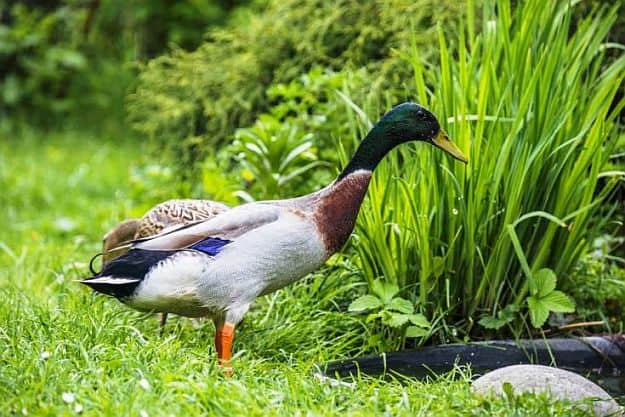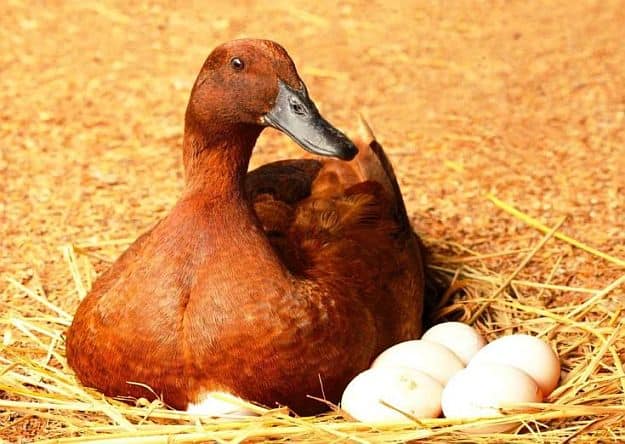Are you daunted by the prospect of raising ducks? Read on and discover how raising ducks can benefit you a lot more than you might think.
Beginners Guide To Raising Ducks
If you enjoy gardening and free eggs but absolutely hate stray bugs, ducks would make a perfect addition to your homestead flock. A steady supply of nutritious and tasty homegrown eggs are practically a certainty with a flock of chickens, but why not consider raising ducks too? Continue reading and you'll find out why you should start raising ducks for your homestead and some helpful tips to get started.
Reasons why raise ducks for your homestead…
1. Ducks Are Good For Your Garden

While chickens scratch the dirt and disturb your garden soil, ducks will leave your plants alone. Except for lettuces and ripe strawberries, that is–both of which are duck favorites. Ducks are steady hunters for pests, especially slugs and snails, which are detrimental to your tomato plants.
2. Ducks Are Low Maintenance

With ducks nothing goes to waste, they can definitely feast on your leftovers, plus they eat all kinds of pests such as snails, worms, cockroaches, fly larvae, mosquitoes, and possibly wasps. Ducks can feed, walk, and bathe themselves.
3. Ducks Produce Tastier and More Nutritious Eggs

Duck eggs are an alkaline-producing food that can help restore and maintain the body’s natural pH equilibrium. It contains six times the Vitamin D, twice the Vitamin A, and twice the cholesterol of chicken eggs. Read more about ducks vs chicken eggs.
Ready to get started? Here’s how to….
1. Choose A Breed
There are dozens of duck breeds to choose from. However, the best choices that top efficiency and year round egg production are Campbells, Welsh Harlequins, Indian Runners, Magpies, and Anconas.

- Campbells are hardy and prolific egg layers. It has been recorded that the best number was nearly 340 eggs a year although it is more common to expect around 200 eggs per year.
- Welsh Harlequins are docile and placid, and would rather stay in the garden and hunt enthusiastically for insects instead of flying. It can lay a respectable 100 to a superb 200 eggs a year and has a carcass that is big enough for a table.
- Indian Runners are considered the most amusing of the domestic ducks. They’re the closest thing you can get to a Penguin or a walking wine bottle. So aside from their laying prowess, they’re sure to provide you with long hours of entertainment as you watch these slender creatures putter around your garden.
- Magpies are friendly and domesticated, so they make good family pets. They’re good layers at up to 200 mainly white, but sometimes blue, or green eggs per year.
- Ancona is an adaptable, hardy, all-purpose duck that typically lays 210 to 280 blue, cream, or white eggs yearly. It grows relatively quickly and generates high-quality meat that is less fatty and more flavorful than that of most Pekin ducks.
2. Plan A Pair
Remember ducks are highly sociable creatures, having only one will likely be very lonely unless you have all time you can spend with him. Plan of having two and see how it goes.
3. Raise Ducks with Feeds
:max_bytes(150000):strip_icc():format(webp)/feedducks-58a6d3b83df78c345b53a637.jpg)
Aside from eating insects and leftovers, it is important to know what is really best for your ducks so that they can have the nutrition they need to lay sustainable number of eggs. It is ideal to provide ducks pellets than fine, powdery feeds, because it helps lessens waste and reduces the risk of choking.
4. Provide Drinking Water
It’s important to know and understand that high-producing ducks require a continuous supply of clean drinking water. Both the size and number of eggs will suffer if ducks are not properly hydrated.
Ducks love water, so you need to provide a container of water where they can also clean their eyes and bills, or even dip their entire head.
5. Build a Housing or Duck Coop
A good housing or duck coop has the following characteristics.
- It provides protection from predators.
- Keeps rain, wind, and snow out.
- Has proper ventilation and no drafts.
- It is a perfect place to lay.
- Water and feed are available.
- Easy to clean
- Comfortable and substantial for ducks.
6. Enhance With Proper Lighting
Like chickens, ducks must be exposed to a minimum of 13 to 14 hours of light daily for consistent winter egg production.
Want more inspiration for raising ducks? Let’s watch this video from Podchef:
Ready now to raise ducks, my fellow homesteaders? Well, remember once you decide to raise ducks, you'll need to devote time to their needs and well-being, and the work may not be necessarily easy but absolutely fun and doable.
Will you now start raising ducks in your homestead? Let us know how it went in the comments section below.
Looking for the perfect watering station for your flock? Check out here 10 easy to build watering stations to keep your flock well hydrated!
Follow us on Instagram, Twitter, Pinterest, and Facebook!
This post was originally published in July 2016 and has been updated for quality and relevancy.

I needed this at this moment. I recently discovered that although allergic to chicken eggs, I can eat duck eggs. Unfortunately, it cost me over $20 to find that out with a dozen duck eggs (the cost of eggs plus shipping, since no one near me has duck eggs). I told my husband I definitely need to keep my own ducks because eating low-carb out of medical necessity, I use an awful lot of eggs. I also prefer the taste of duck eggs because the yolk is the only part of an egg I really like, and the ratio of yolk/white in duck eggs is huge compared to the yolk/white ratio in chicken eggs. It definitely lends egg flavor to whatever I fix. Duck eggs make the best pancakes ever!